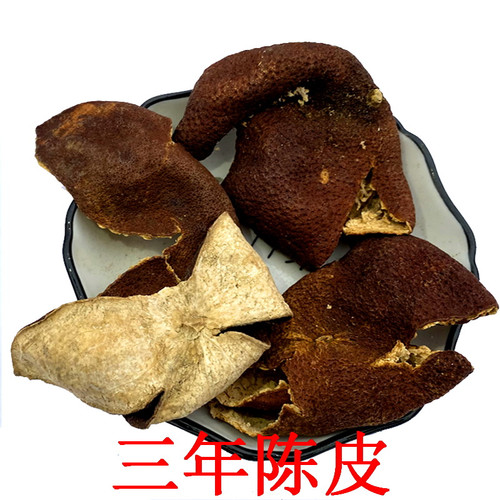Product Overview
Parts used: Dried pericarp of the ripe fruit
TCM category: Herbs that regulate Qi
TCM nature: Warm
TCM taste(s): BitterPungent
Meridian affinity: Spleen Lung
Scientific name: Citrus reticulata
Use of tangerine peel (Chen Pi) in TCM
Please note that you should never self-prescribe TCM ingredients. A TCM ingredient is almost never eaten on its own but as part of a formula containing several ingredients that act together. Please consult a professional TCM practitionner, they will be best able to guide you.
Preparation: Remove impurities, spray water, shred and dry.
Dosage: 3 - 9 grams
Main actions according to TCM*: Warms the Spleen and regulates the Middle Burner Qi. Dries Dampness and disperses Phlegm from the Lungs and Middle Burner. Reduces the potential for Stagnation caused by tonifying herbs.
Primary conditions or symptoms for which tangerine peel may be prescribed by TCM doctors*: Loss of appetite Vomiting Diarrhea Coughing Phlegm Abdominal bloating
Contraindications*: Should not be used when there is cough with Yin or Qi Deficiency; this could manifest as Dry cough or coughing blood. It should also be avoided when there is sticky yellow phlegm.
Common TCM formulas in which tangerine peel are used*:
For Wind-Cold cough combine tangerine peel with platycodon roots (Jie Geng), apricot seeds (Xing Ren) and perilla leaves (Zi Su Ye).
For bloating, nausea and vomiting caused by blocked Qi of the Spleen and Stomach combine tangerine peel with amomum fruits (Sha Ren) and houpu magnolia bark (Hou Pu).
For an invasion of External Wind and Cold in summer with chills, fever, headache, nausea, vomiting and diarrhea combine tangerine peel with korean mint (Huo Xiang), houpu magnolia bark (Hou Pu), perilla leaves (Zi Su Ye) and crow-dipper rhizomes (Ban Xia).
For food poisoning and overindulgence in rich and greasy foods or alcohol with symptoms of abdominal bloating, belching and acid regurgitation combine tangerine peel with hawthorn berries (Shan Zha), radish seeds (Lai Fu Zi), medicated leaven (Shen Qu), crow-dipper rhizomes (Ban Xia), poria-cocos mushrooms (Fu Ling) and forsythia fruits (Lian Qiao).
For chronic Lung Deficiency coughs combine tangerine peel with chinese plums (Wu Mei), crow-dipper rhizomes (Ban Xia), fresh ginger (Sheng Jiang) and apricot seeds (Xing Ren).
For relieving the symptoms of morning sickness and preventing miscarriage combine tangerine peel with perilla leaves (Zi Su Ye) and amomum fruits (Sha Ren).
For the treatment of prolapsed Qi with symptoms of chronic fatigue and weakness as a result of physical exertion or stress combine tangerine peel with bupleurum roots (Chai Hu), codonopsis roots (Dang Shen), atractylodes rhizomes (Bai Shu), milkvetch roots (Huang Qi), ginseng (Ren Shen), liquorice (Gan Cao), dong quai (Dang Gui) and bugbane rhizomes (Sheng Ma).
For constipation and abdominal fullness caused by Heat combine tangerine peel with alexandrian senna leaves (Fan Xie Ye).
For swollen and painful legs combine tangerine peel with pumpkin seeds (Nan Gua Zi) and flowering quince (Mu Gua).
For Diarrhea due to Damp-Cold combine tangerine peel with sichuan pepper (Hua Jiao), atractylodes rhizomes (Bai Shu) and costus roots (Mu Xiang).
Key TCM concepts behind tangerine peel (Chen Pi)'s properties
In Traditional Chinese Medicine (TCM), tangerine peel are plants that belong to the 'Herbs that regulate Qi' category. Herbs in this category typically treat a TCM condition called 'Qi Stagnation'. Concretely it means that Qi is blocked in the body's Organs and Meridians, most typically the Stomach, Liver, and to a lesser extent, the Lungs. In modern medicine terms, Qi Stagnation often translates into psychological consequences such as depression, irritability or mood swings. It's also frequently associated with conditions such as premenstrual syndrome (PMS), menopausal symptoms, the development of breast swellings as well as various digestive disorders.
Furthermore tangerine peel are plants that are Warm in nature. This means that tangerine peel tend to help people who have too much "cold" in their body, although with less effect than a plant that would be Hot in nature. Balance between Yin and Yang is a key health concept in TCM. Those who have too much cold in their body are said to either have a Yin excess (because Yin is Cold in nature) or a Yang deficiency (Yang is Hot in Nature). Depending on your condition tangerine peel can help restore a harmonious balance between Yin and Yang.
Tangerine peel also taste Bitter and Pungent. The so-called "five elements" theory in Chinese Medicine states that the taste of TCM ingredients is a key determinant of their action in the body. Bitter ingredients like tangerine peel tend to have a cleansing action on the body by clearing heat, drying dampness and promoting elimination via urination or bowel movements. On the other hand Pungent ingredients tend to promote the circulations of Qi and body fluids. That's why for instance someone tends to sweat a lot when they eat spicy/pungent food.
The tastes of ingredients in TCM also determine what organs and meridians they target. As such tangerine peel are thought to target the Spleen and the Lung. In TCM the Spleen assists with digestion, blood coagulation and fluid metabolism in the body. In addition to performing respiration, the Lungs are thought to be a key part of the production chain for Qi and the body fluids that nourish the body.
Use of tangerine peel (Chen Pi) as food
Tangerine peel are also eaten as food. It is used as an ingredient in dishes such as Tangerine Creme Brulee.










